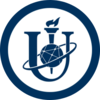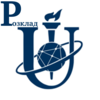Materials & News
2022 year
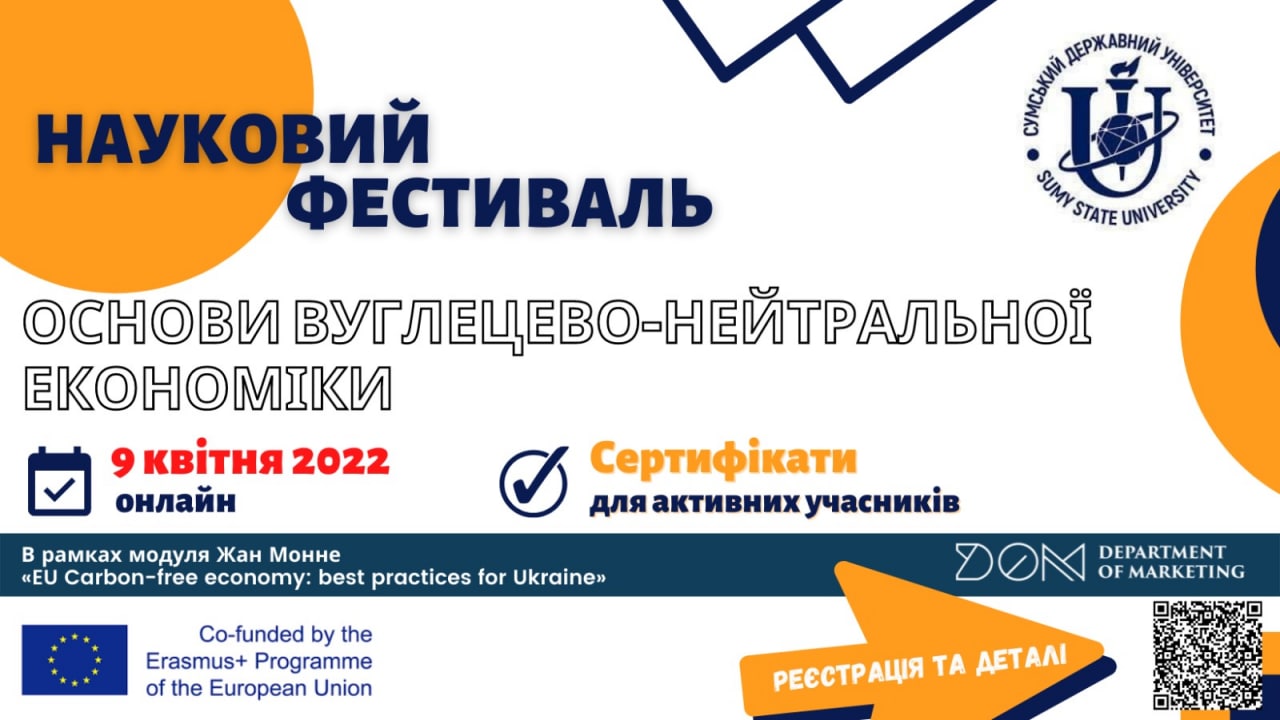
Online Scientific Festival "The Introduction into the Carbon-Free Economy".
In the frame of the Jean Monnet Module «EU Carbon-free economy: best practices for Ukraine», we invite all green-minded Masters and Postgraduate students to participate in the Online Scientific Festival "The Introduction into the Carbon-Free Economy".
On April 9, 2022, the European-oriented experts enrich you with fundamental knowledge of the EU Carbon-free economy, especially outlining the main goals and principles of the Carbon-free movements on the EU and national levels.
Don't lose an opportunity to increase your green awareness and expand the network!
Fill out the registration form now
Deadline for application submission is 31.03.2022
The project is co-funded by the Erasmus+ programme of the European Union.
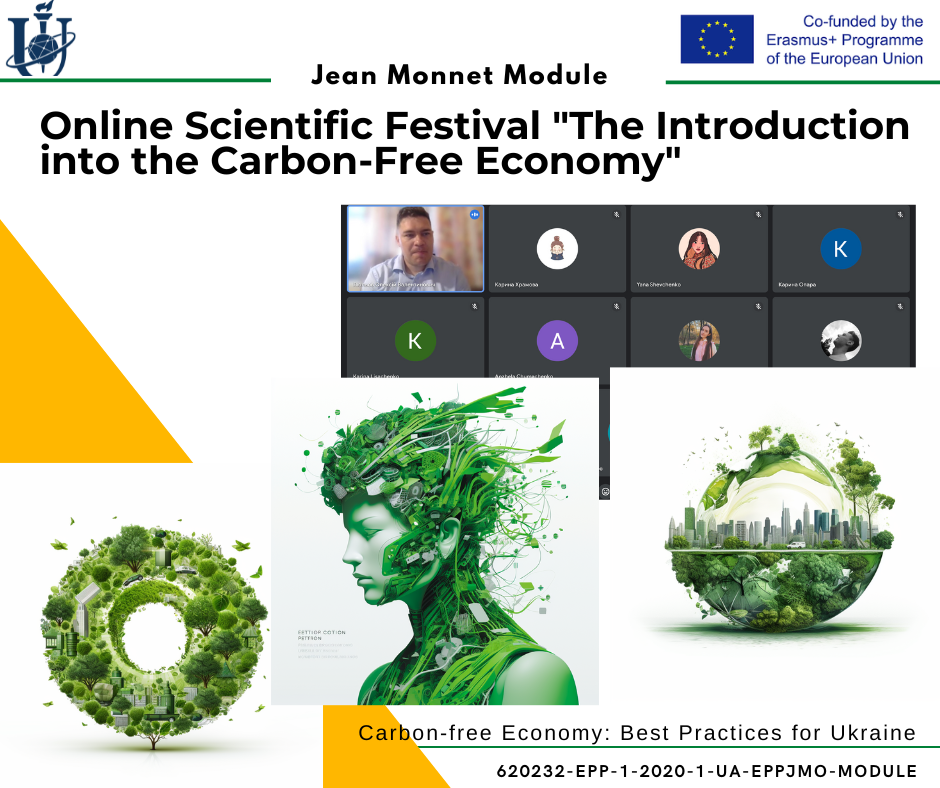
Global Collaboration: Online Scientific Festival "The Introduction into the Carbon-Free Economy" Unveils Ambitious Educational Agenda
The festival, which welcomes 150 MA and Ph.D. students from the participating Ukrainian universities, has outlined ambitious learning outcomes. These include:
- Carbon-Free Economy Fundamentals: Participants decipher the intricacies of the Carbon-Free Economy, gaining a profound understanding of its foundational concepts.
- EU Carbon-Free Economy Goals and Principles: The festival aims to illuminate the main goals and principles shaping the European Union's Carbon-Free Economy, including a comprehensive exploration of the Paris Agreement and defining targets and achievements.
- EU Legislation and Policies in Carbon-Free Spreading: Participants categorize the essentials of EU legislation and policies that underpin the propagation of a carbon-free Europe, with a special focus on the EU Emissions Trading System and the evolution of the EU Climate strategy from 2020 to 2050.
As the world unites in the pursuit of sustainable practices, "The Introduction into the Carbon-Free Economy" Online Scientific Festival stands as a testament to the power of global education and collaboration in shaping a more environmentally conscious future.
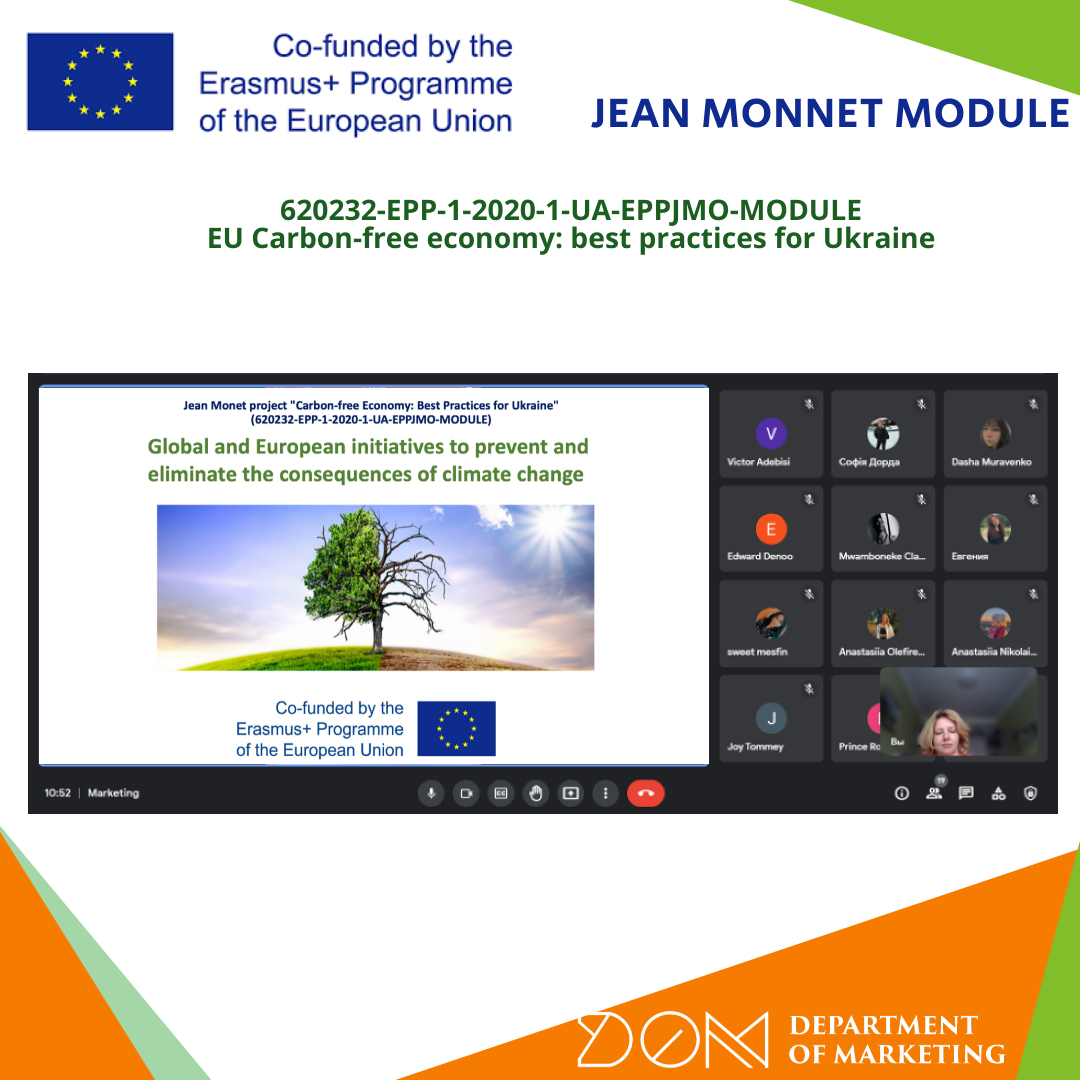
World and European initiatives to prevent and eliminate the consequences of climate change
Within the framework of individual cases, the participants of the event talked about the role of international environmental protection organizations, in particular, UNESCO, UNEP, UNICEF, UNCED, WHO, FAO, Green Peace, and others.

Training: green lifestyle promotion
On 25 April 2022, co-holder of Jean Monnet Module "Carbon-neutral economy: best practices for Ukraine" (620232-EPP-1-2020-1-UA-EPPJMO-MODULE) Tetyana Pimonenko and Oleksiy Lyulyov (guest speaker) conducted training on green lifestyle promotion for students of Sumy State University. The training brought together 54 students from different specialities. During the training, the speakers raised several issues regarding the relevance of green lifestyle promotion using modern digital tools. Oleksiy Lyulyov spoke in more detail about the contemporary trends in the development of digital tools, especially during the pandemic.
The speakers held a master class on developing posts and stories on Instagram. During the training, students could develop their posts on green lifestyle and try to promote them on social media.

Carbon-free economy: European policy and regulation
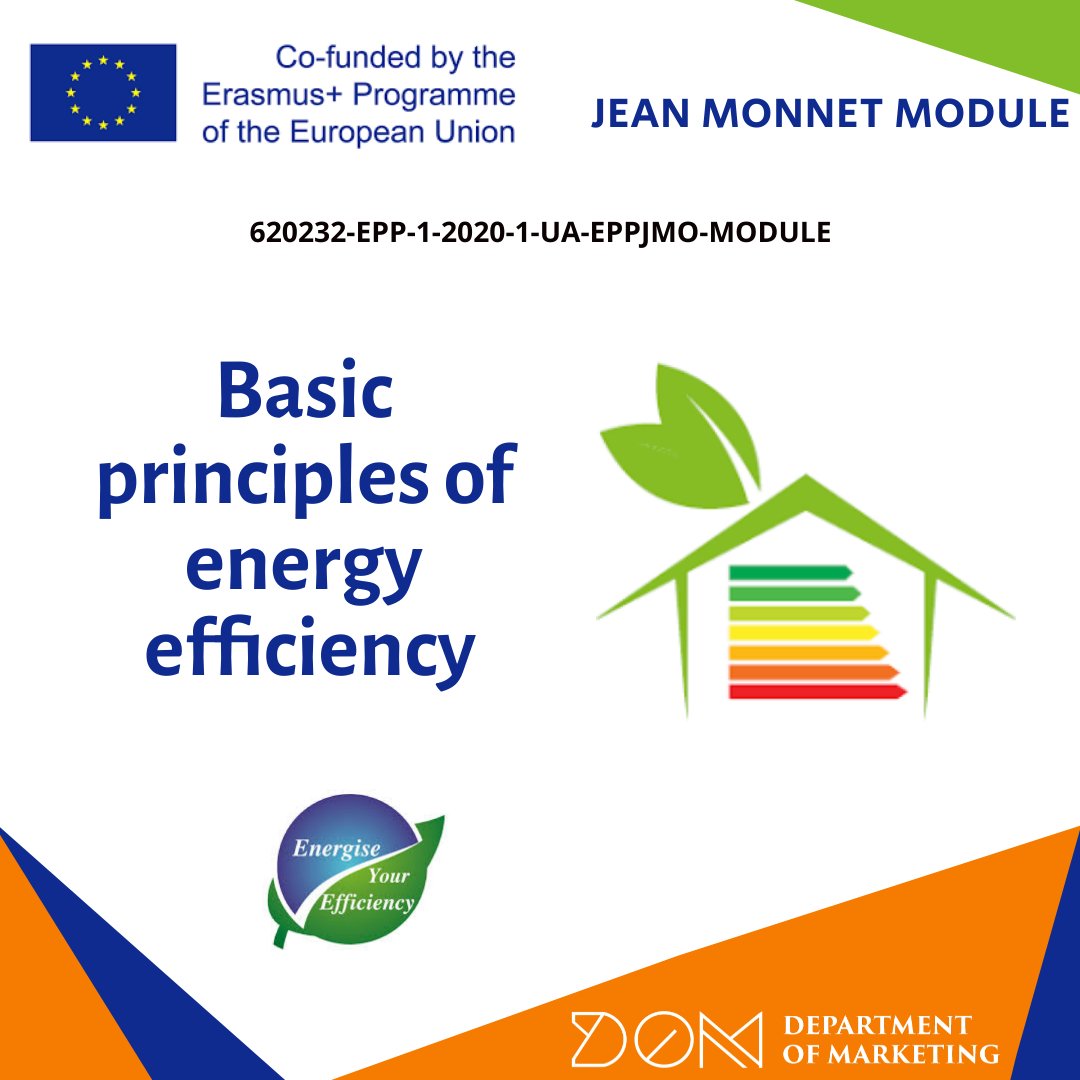
Principles of energy efficiency: from theory to practice
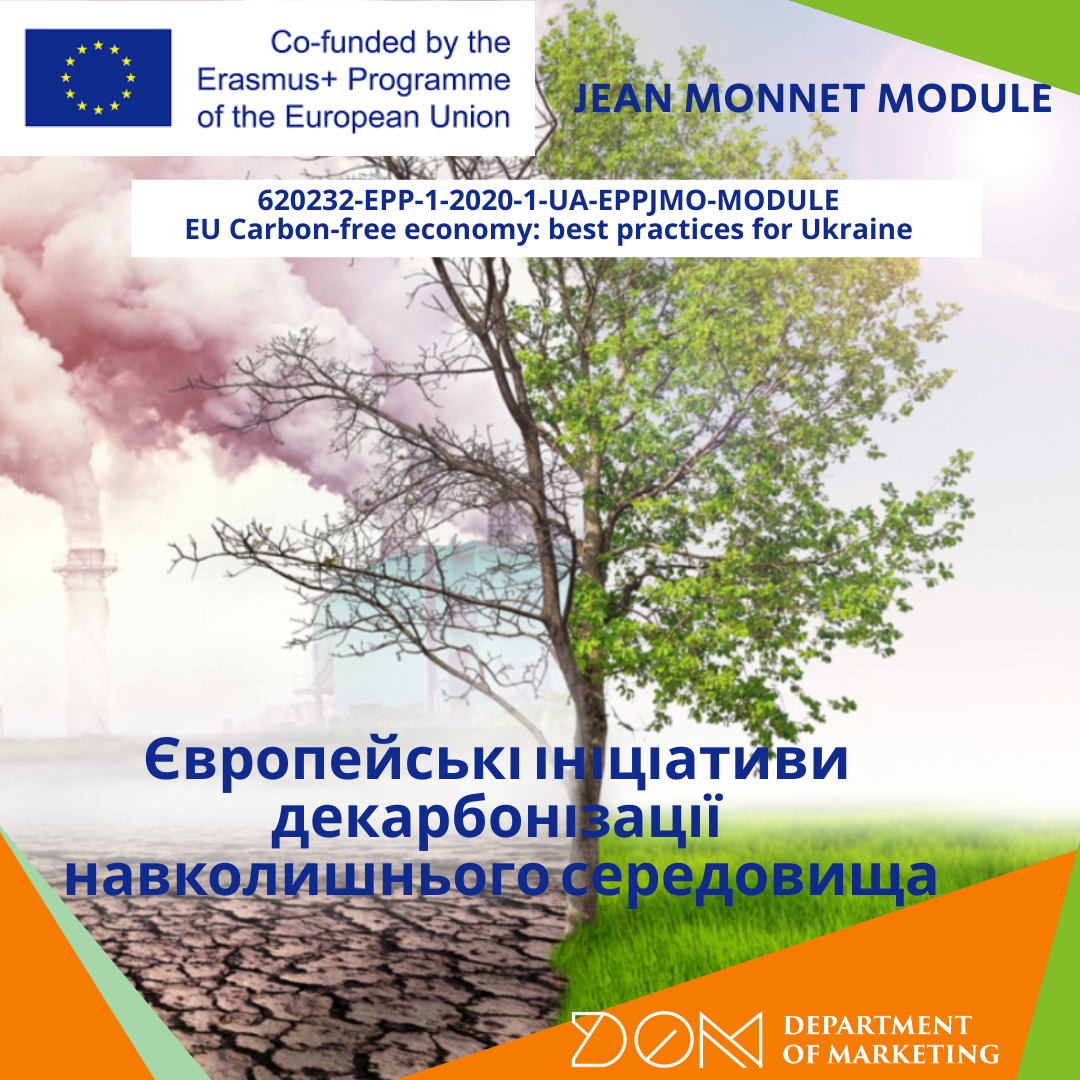
European initiatives for environmental decarbonization

The Renewable Energy Directive: Objectives and Key Principles
The summer for marketers began with the continuation of the Jean Monet project "Carbon Free Economy: Best Practices for Ukraine" (620232-EPP-1-2020-1-UA-EPPJMO-MODULE). On June 8, 2022, Olena Chygryn and Tetyana Pimonenko conducted an online training dedicated to the implementation of the directives of the European Union on renewable energy. Participants from Ukraine Western Ukrainian National University, Ternopil, National TU "Dniprov Polytechnic", Dnipro, Sumy State University (in total 52) learned that the Renewable Energy Directive is a biofuels incentive program operating in the European Union that aims to increase the use of energy from renewable sources to reduce greenhouse gas emissions. Today, all European countries have set targets for the use of renewable energy sources, and within the framework of the European Green Deal, Europe must become the first climate-neutral continent by 2050. During the training, students had the opportunity to learn about the main stages of the development of renewable energy in the EU and discuss the volumes of its production for different EU countries and Ukraine.
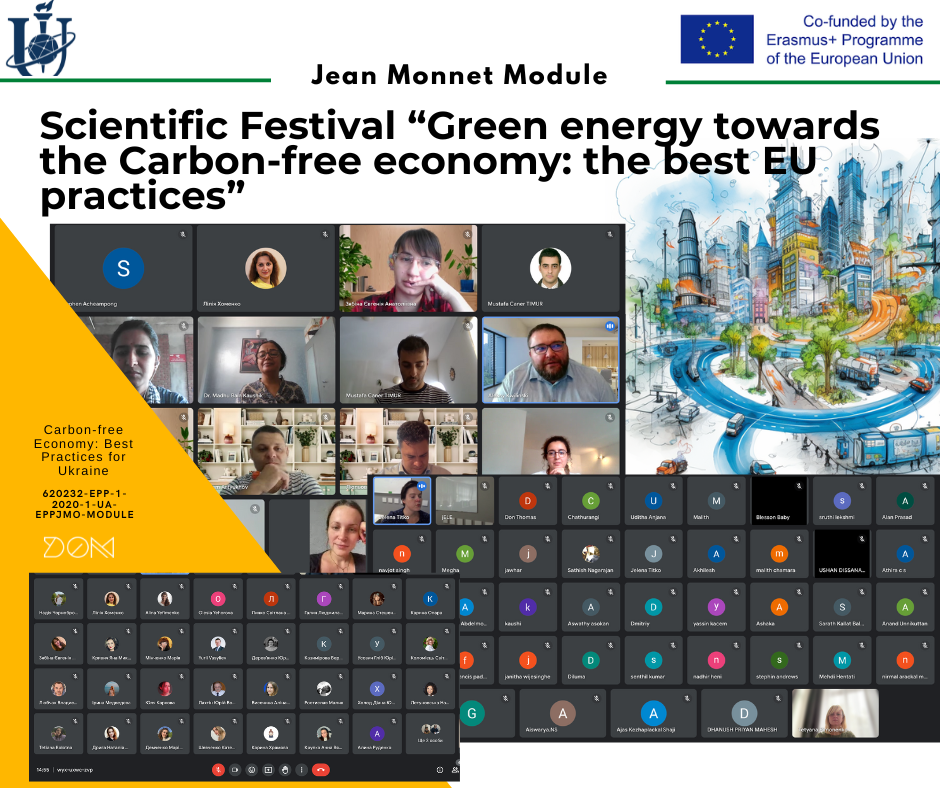
Scientific Festival “Green energy towards the Carbon-free economy: the best EU practices”
The curtains have closed on the Scientific Festival, "Green Energy Towards the Carbon-Free Economy: The Best EU Practices," hosted by Sumy State University. From June 13 to June 17, 2022, the event served as a dynamic hub for 111 participants eager to delve into the forefront of sustainable energy solutions.
Olena Chygryn set a visionary tone for the festival, inspiring all with her commitment to advancing green energy solutions. Her leadership ignited a collective determination to pave the way for a carbon-neutral future.
Tetyana Pimonenko's insights spurred meaningful conversations about the challenges and opportunities within the green energy landscape. Her thought leadership encouraged participants to critically examine the path towards sustainable practices.
Yana Us brought dynamic energy, creating an atmosphere conducive to exploration and creativity. Her emphasis on practical applications resonated, empowering participants to transform ideas into actionable solutions.
Serhiy Lyeonov challenged conventional boundaries with trailblazing presentations, urging participants to think beyond the ordinary. His commitment to pushing the envelope in green energy discourse contributed to the festival's intellectual vibrancy.
As a guest speaker, Oleksii Lyulyov brought a fresh global perspective to the discussions. His experiences underscored the interconnected nature of sustainable initiatives, emphasizing the imperative for international collaboration.
Tatjana Tambovceva added a broader context to green energy practices with her international viewpoint. Her contributions highlighted the importance of cross-cultural collaboration in driving sustainable initiatives.
Aleksy Kwilinski shared invaluable insights and best practices from Poland, contributing to the festival's rich tapestry of experiences. His lessons underscored the universality of challenges in achieving a carbon-free economy.
The success of the festival lies in the collaborative efforts of these diverse voices, creating an environment where ideas flowed freely, and collaborations were sparked. While the Green Energy Festival may have concluded, its impact lingers as a beacon guiding us toward a sustainable and carbon-neutral future.
Thank you to all participants, speakers, and organizers for making this event a resounding success. Together, we continue the journey towards a greener and more sustainable world.
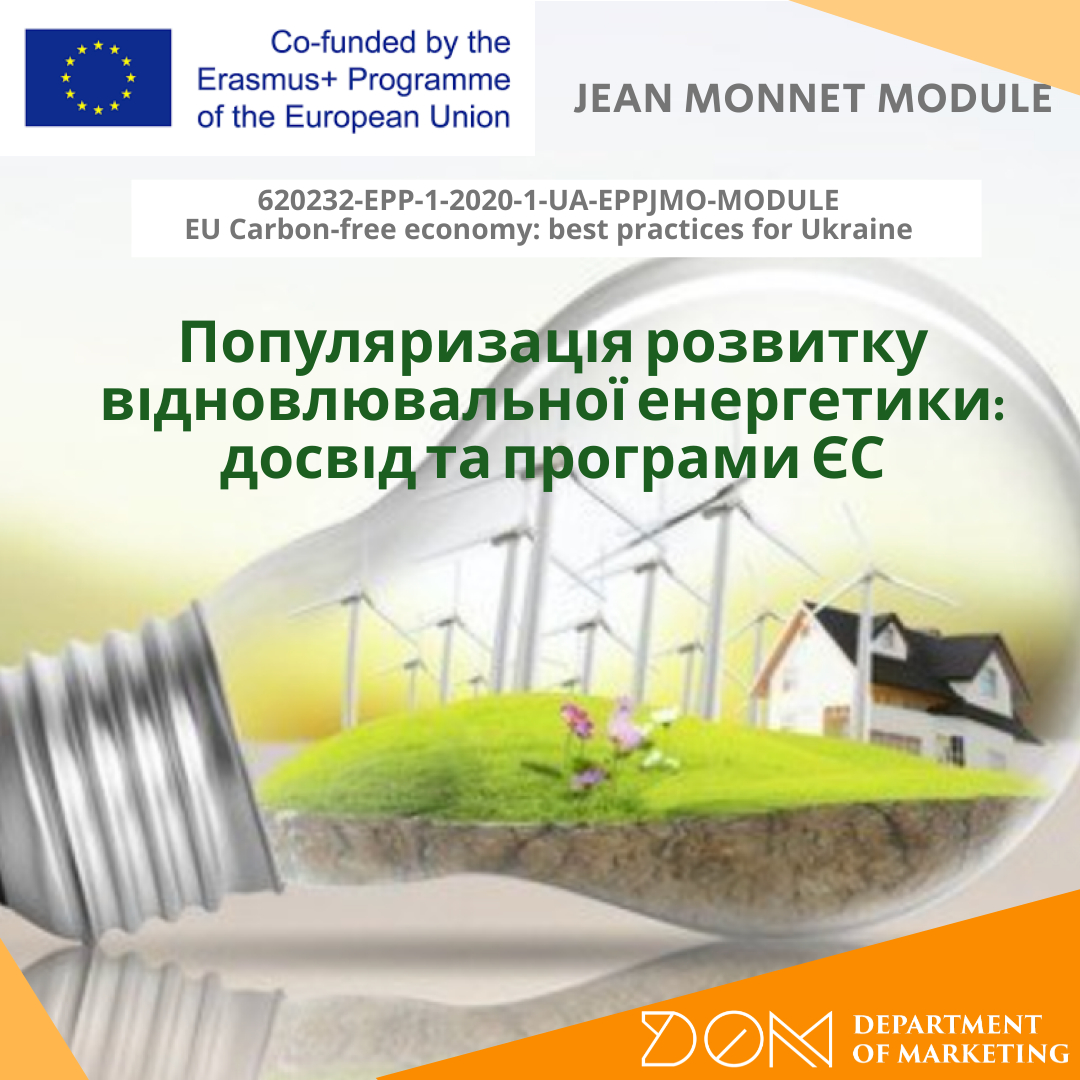
Promotion of the development of renewable energy: experience and programs of the EU
Achieving success in the development of renewable energy is possible only with the effective implementation of relevant projects and programs at the country level. As part of the implementation of Jean Monet's project "Carbon-free economy: best practices for Ukraine" (620232-EPP-1-2020-1-UA-EPPJMO-MODULE), Olena Chygryn and Tetyana Pimonenko on September 7, 2022, held a lecture for marketing students devoted to popularization development of renewable energy. 44 BA and MA students took part in a discussion-discussion dedicated to the national goals of the EU countries regarding the share of renewable energy in the gross final energy consumption according to the Directives. The listeners were interested in the peculiarities of the formation of energy communities, as collective civic initiatives that invest in clean energy infrastructure are one of the ways to promote the culture of sustainable development and further energy transition.
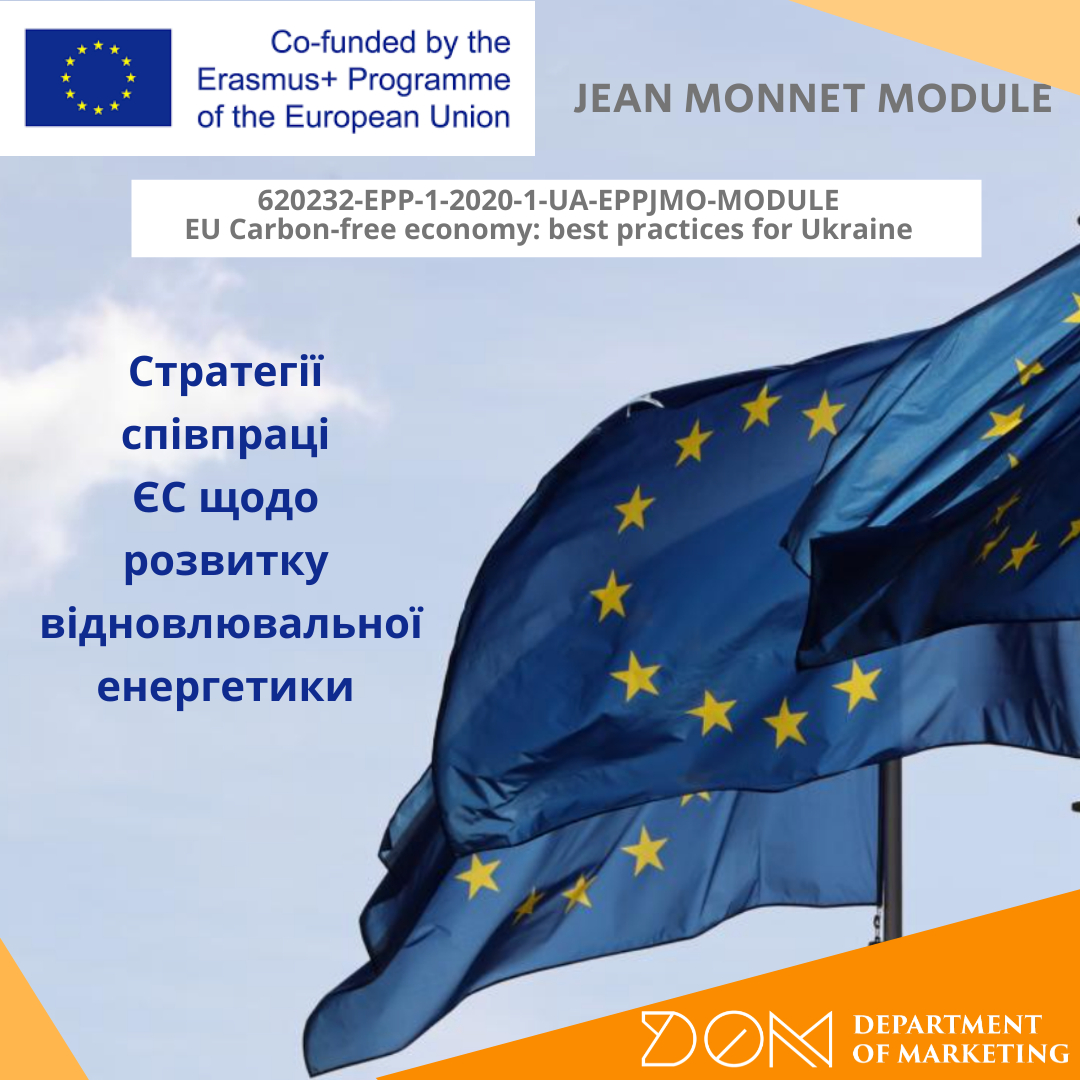
EU cooperation strategies for the development of renewable energy
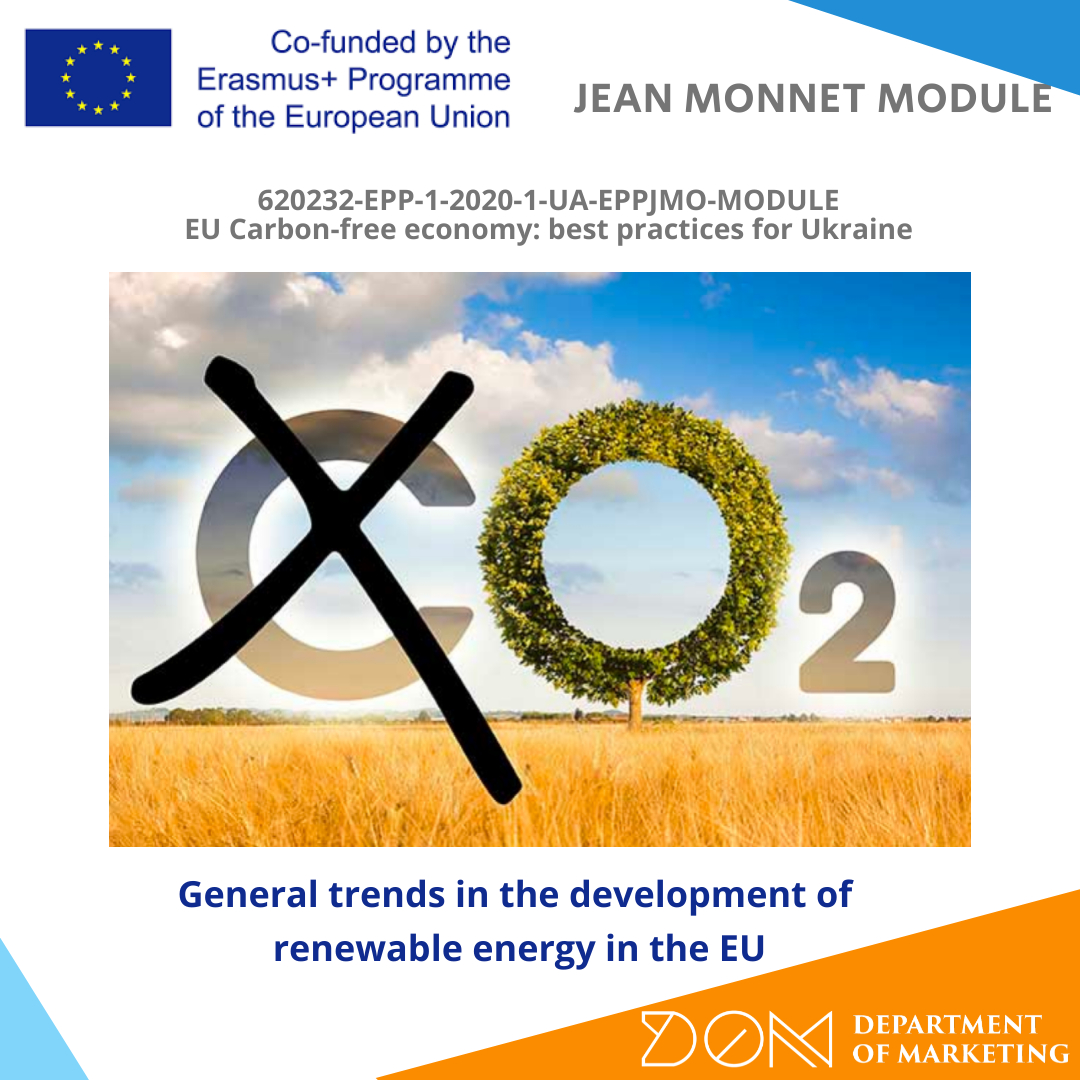
General trends in the development of renewable energy in the EU
The key issues of the lecture were:
- studying the dynamics of the development of renewable energy in the EU countries
- studying the experience of developed countries (Iceland, Norway, Germany)
- prospects for the development of renewable energy in Ukraine.
More than 54 students from Economics, Finance, Marketing and Management, Journalists, Engineer, Computer Science specialities obtained the certificate considering their results.

Key elements of the energy policy of EU countries: training and lectures
From 21 November to 25 December 2022 co-executor of the Jean Monnet Module "Carbon-free economy: Best practices for Ukraine" (620232-EPP-1-2020-1-UA-EPPJMO-MODULE) Tetyana Pimonenko and invited speaker Oleksii Lyulyov conducted a series of lectures and practice-oriented trainings for students and postgraduates of Sumy State University, Riga Technical University, WSB University in Dobrova Gurnicha, and Kaunas Technical University on the main elements of the EU energy policy and the directives that regulate it.
Studying the main elements and directives that regulate the EU energy policy is important for understanding modern trends in the development of the energy sector and its impact on the economy and social development of countries. This topic is also relevant for Ukraine, as the country has ambitious plans to transition to a carbon-neutral economy, so knowledge of the EU energy policy can be useful for developing corresponding strategies and decisions in this field. In addition, knowledge of the EU energy policy can help students from various specialities to better understand the principles and mechanisms of functioning of the modern energy sector in an international context.
During the lectures, the speakers emphasized the relevance of this topic and its importance for Ukraine. 43 students (BA and MA) had the opportunity to familiarize themselves with changes in the EU energy policy and its impact on Ukraine, as well as with best practices for implementing a carbon-neutral economy. The lectures received high marks from students and allowed them to expand their knowledge of the EU energy policy.

Training and Lectures within Jean Monnet Module "Carbon-free economy: best practices for Ukraine"

Virtual classes within the Jean Monnet Module "Carbon-free economy: best practices for Ukraine"

Open lectures "Renewable energy and the EU Carbon trade market"
From 1 October to 20 December 2022, a series of lectures on renewable energy and the EU carbon trade market took place at Sumy State University. The speaker at the event was Sergiy Leonov, a co-executor of the Jean Monnet Module project "Carbon-free Economy: Best Practices for Ukraine" (620232-EPP-1-2020-1-UA-EPPJMO-MODULE).
In his presentations, Sergiy Leonov talked about the benefits of using renewable energy sources and emphasized the importance of developing this direction for Ukraine. The EU carbon trade market, its peculiarities and development prospects were also discussed.
63 students from Sumy State University highly appreciated the lecture and noted that they received a lot of useful information. The event became a valuable experience for young people who want to deal with environmental and energy issues in the future.


